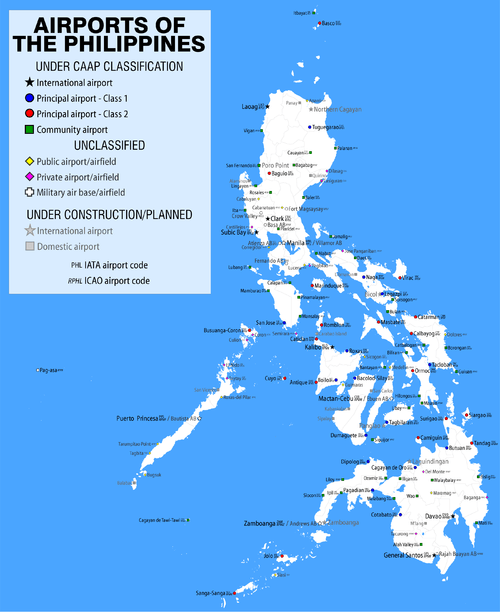Lumbia Airport
| Lumbia Airport Paliparan ng Lumbia Tugpahanan sa Lumbia | |||||||||||
|---|---|---|---|---|---|---|---|---|---|---|---|
| IATA: CGO – ICAO: RPML | |||||||||||
| Summary | |||||||||||
| Airport type | Military | ||||||||||
| Operator | Philippine Air Force | ||||||||||
| Serves | Cagayan de Oro | ||||||||||
| Location | Barangay Lumbia, Cagayan de Oro | ||||||||||
| Elevation AMSL | 183 m / 601 ft | ||||||||||
| Coordinates | 08°24′56″N 124°36′40″E / 8.41556°N 124.61111°ECoordinates: 08°24′56″N 124°36′40″E / 8.41556°N 124.61111°E | ||||||||||
| Map | |||||||||||
.svg.png) CGY Location in the Philippines | |||||||||||
| Runways | |||||||||||
| |||||||||||
| Statistics (2011) | |||||||||||
| |||||||||||
|
2012 Philippine Statistical Yearbook | |||||||||||
Lumbia Airport (Filipino: Paliparan ng Lumbia, Cebuano: Tugpahanan sa Lumbia) (ICAO: RPML), also known as Cagayan de Oro Airport, was the domestic airport that served the general areas of Cagayan de Oro and Northern Mindanao, located in the province of Misamis Oriental in the Philippines. It was the second busiest airport in Mindanao, after Francisco Bangoy International Airport in Davao City prior to the opening of Laguindingan Airport.
The airport was classified as a Class 1 principal (major domestic) airport by the Civil Aviation Authority of the Philippines, a body of the Department of Transportation and Communications that is responsible for the operations of not only this airport but also of all other airports in the Philippines except the major International airports.
Lumbia Airport took its name from its location in Barangay Lumbia. It now serves as a minor air base of the Philippine Air Force, with service equipment of OV-10 Bronco aircraft as well as UH-1 Huey and MD-520MG Defender helicopters.
On June 15, 2013, Laguindingan Airport in the Municipality of Laguindingan, Misamis Oriental, some 46 kilometers (29 mi) northwest of the city, replaced Lumbia Airport. The new airport serves Northern Mindanao, as well as its major cities, Iligan and Cagayan de Oro.[1][2]
History
Lumbia Airport was opened in the 1930s during the time of the American occupation of the Philippines. In World War II, the Japanese controlled the airstrip, with the runway being extended by the use of forced labor.
It remained as Cagayan de Oro's only airport, as the city grew in both size and population. However, it came to the point where Lumbia airport could no longer keep up with CDO's rapid growth. Additionally, its higher elevation above the city meant that many flights had to divert during rain or thick fog.[3]
At 22:00 on Friday, June 14, 2013, the last passenger flight departed Lumbia Airport, signalling the end of a chapter in Philippine aviation history.[4]
As a military air base
The former airport is now under control of the 10th Tactical Operations Group of the Philippine Air Force. The airport has been selected by the US military for building their facilities under the Enhanced Defense Cooperation Agreement.[5]
Airlines and destinations
The destinations of Lumbia Airport before its closure.
| Airlines | Destinations |
|---|---|
| Cebu Pacific | Cebu, Davao, Iloilo, Manila, Zamboanga |
| Philippine Airlines | Manila |
| Philippine Airlines operated by PAL Express | Cebu, Davao, Manila |
Accidents and Incidents
- On February 2, 1998, Cebu Pacific Flight 387 from Ninoy Aquino International Airport in Manila to Cagayan de Oro, flown by a McDonnell Douglas DC-9, crashed into Mount Sumagaya in Claveria, Misamis Oriental, killing all 99 passengers and 5 crew on board. The cause of the crash was blamed on a number of factors: pilot error, an unusual flight route (due to an unscheduled stopover in Tacloban to deliver aircraft parts for another Cebu Pacific DC-9), bad weather and incorrect air charts.[6]
See also
References
- ↑ http://www.cab.gov.ph/news/1071-dotc-resets-transfer-to-new-cagayan-de-oro-airport-to-june-15
- ↑ http://www.mb.com.ph/article.php?aid=8103&sid=2&subid=80#.UXV3jaI05jZ
- ↑ http://langyaw.com/2013/06/14/its-an-end-of-an-era-for-lumbia-airport/
- ↑ http://www.mindanews.com/top-stories/2013/06/14/an-era-of-aviation-history-ends-with-closure-of-lumbia-airport-a-new-era-begins-with-opening-of-laguindingan-airport/
- ↑ "US to build facilities in old CDO airport in 2016". Rappler. February 5, 2016. Retrieved May 27, 2016.
- ↑ http://www.mindanews.com/top-stories/2013/02/04/15-years-after-flight-387-crashed-questions-remain-unanswered/
External links
| Wikimedia Commons has media related to Lumbia Airport. |
